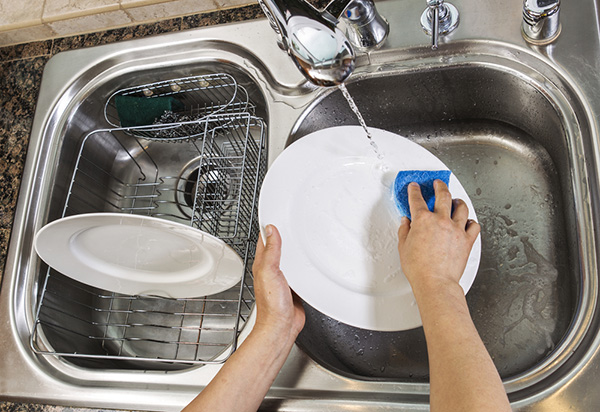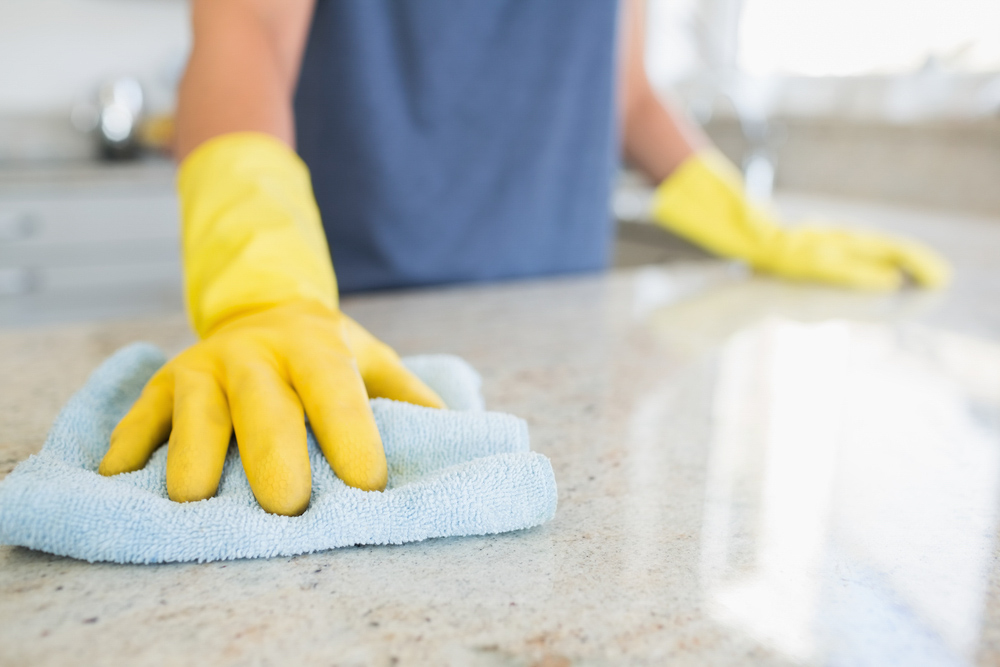The kitchen is a breeding ground for bacteria and germs. Follow these simple steps to keep your kitchen cleaner.
Your kitchen might look neat and clean, but any food prep area is notorious for attracting micro-organisms that could cause foodborne illness. To keep your kitchen clean and your family and guests healthy, follow these simple tips.
Make sure your kitchen has adequate lighting
The first step to keeping your kitchen clean is making sure you’re able to see when it’s not. Have adequate ceiling lighting and turn the lights on when you come into the kitchen to cook, even if you have a large amount of natural light. If you don’t have lights over your stove or under the wall cabinets, consider installing them and make sure to keep the bulbs fresh.
Keep your countertops clear of unnecessary items
You may love how your collection of olive oil and small-batch vinegars looks lined up next to the stove, or your mother’s vintage KitchenAid mixed mixer, but the more stuff you have on your kitchen countertops, the harder it is to clean, and the harder it is to clean, the less likely you are to do it thoroughly. Keep only the items and appliances you use all the time on the counter, and clean around, behind, and under them regularly. Also—don’t neglect the backsplash!

Clean up cooking messes immediately
After a long day at work, making dinner for your family, eating, and getting everything into the dishwasher, it’s easy to glance at the stove splattered with grease or spaghetti sauce or worse and think, “That’s okay, I’ll wipe it up tomorrow.” The only problem is, tomorrow will be the same story and pretty soon, your stovetop is caked with a week’s worth of sticky cooking residue attracting dust and possibly kitchen flies or other undesirables. By the time you get around to it, your stove will need at least a good 30-minute scrub down.
Don’t wait to clean up your cooking mess—take five minutes and wipe down your stove with hot soap and water or a kitchen cleaning product. If you’ve spilled something, use a hot pad to remove the burner and clean underneath.
Clean every surface
You might not do it every day, but in the course of your regular kitchen cleaning, make sure not only to wipe up crumbs and spills, but to disinfect every surface in your kitchen, including stove and oven knobs, the face of your microwave, oven, and other appliances. Periodically, you’ll also want to clean the vent hood, cabinet handles, light fixtures, baseboards, and any decorative accessories or pictures. Every surface in your kitchen can attract and harbor germs, and if you look really closely, you’ll see that they do.

Clean the sink after washing the dishes
Just because your dishes are spotless doesn’t mean your sink is. Chances are the grease and grime you’ve washed off your pots and pans hasn’t all made its way down the drain. It’s worth the extra minute to spray down the sink and the surrounding area with your favorite organic kitchen cleaner. Wipe and rinse the area with a sponge you reserve for cleaning the sink and counters—not the sponge you use to wash your dishes.
Change your dishtowels regularly
Kitchen towels are a great way to transfer nasty bacteria from one part of the kitchen to another. They often stay damp, used multiple times before they’ve had a chance to fully dry, and are also sometimes used for multiple jobs, that is, drying hands, drying dishes, wiping counters, or cleaning up spills.
To mitigate the spread of harmful bacteria via your kitchen towels, change them regularly, even multiple times per day. Also, we suggest using separate towels for drying hands and drying dishes. We like cotton towels for drying our hands and find that a good-quality linen towel is better for drying dishes since it won’t leave tiny threads all over your glasses. If you’ve used a towel for cleaning up a mess in the kitchen, throw it directly into the laundry hamper to be washed.
Wash your hands with soap
It’s so simple, it seems obvious, but a surprising number of people don’t regularly use soap to wash their hands. In the course of preparing a single meal, you’ll likely touch raw meat, followed by vegetables that you may or may not cook, and any number of surfaces and utensils. You might think to wash your hand with soap after touching raw chicken, but what about raw vegetables? Even organically grown veggies risk contamination from e-coli. To prevent foodborne illness from spreading in our kitchen, rinsing your hands isn’t enough. Use soap every time.
Ready to plan your kitchen? Download our kitchen design guide
